#詩經
Explore tagged Tumblr posts
Text
有口難言
The first one is from a peom, 醉睡者(zuì shuì zhě; a drunk sleeping person) by 蘇東坡(sū dōng pō) in 宋朝(song dynasty).
有道难行不如醉, 有口难言不如睡.
if it's difficult to act then be drunk, if it's difficult to say then just sleep.
先生醉卧此石间, 万古无人知此意.
I lie on the gravels, the reason why, no one would know.
This is as the title said, about a person who's drunk. The poet was talented but hapless. Mostly lamenting about his situation. Its literal meaning is, I have mouth but difficult to say.
In here, I think Wen kexing told that idiom not only to Zhao jing but himself as well, just the place where they were, has changed. Wen kexing was difficult to say before but now it is Zhao jing.

眾叛親離
This is from 詩經(shi jing; Classics of poem), it is in one of the chapter, 國風(guo feng). Also it has 160 peaces of poem, and this is from 邶風(Bei feng; bei nation's fork song). The title is 擊鼓(ji gu; Drumming). It was also on episode 25 However, it is not the poem but interpretation of the poem by 鄭玄(zhèng xuán).
于嗟闊兮 不我活兮
Oh, we are parted, we aren't together.
【鄭玄 箋】 箋雲:州籲阻兵安忍,阻兵無眾,安忍無親,眾叛親離。
鄭玄 said, 州吁(zhōu xū) became unruly with military forces, doing massacre. Because of that no one was close to and followed. The speaker of the poem is a loosen remnant, he just want to go back home. So 州吁 doesn't have much people to fight for him. The followers betrayed and the close friends had left.
Zhao jing was cruel to his follwers, no wonder nobody comes to save him.

孤立無援
This is used very commonly but I couldn't find its origin. It seems it's not really old one like from before century but it has been used widely spoken.
Its literal meaning is, stand alone without any help. That's the meaning of it and it is used for. It also intends that there's no one can help or there will be any help in the future. It can describe one's situation or place, even location. Loneliness it is.
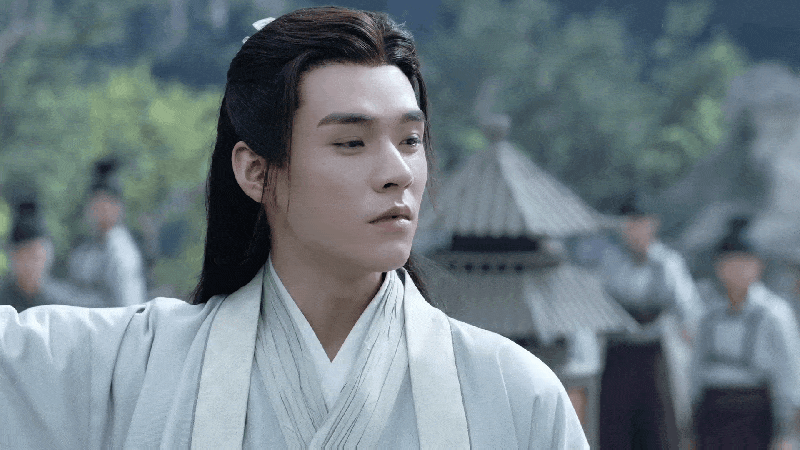
#山河令#word of honor#shan he ling#shl#산하령#배움이 짧아서 모르겠어#ep 33#ep33#詩經#시경 정현전 해석#우와 무슨일이야#온객행이 무슨책 읽었는지 티나는거네#an eye for an eye and a tooth for a tooth.#this is also there but well it's from Code of Hammurabi
5 notes
·
View notes
Text
粒史學加000450《史記》卷三十三〈魯周公世家〉03:就算是周公,被懷疑還是會不高興的!?
──────────原文────────── 其後武王既崩,成王少,在彊葆之中。周公恐天下聞武王崩而畔,周公乃踐阼代成王攝行政當國。管叔及其群弟流言於國曰:『周公將不利於成王。』周公乃告太公望、召公奭曰:『我之所以弗辟而攝行政者,恐天下畔周,無以告我先王太王、王季、文王。三王之憂勞天下久矣,於今而后成。武王蚤終,成王少,將以成周,我所以爲之若此。』於是卒相成王,而使其子伯禽代就封於魯。周公戒伯禽曰:『我文王之子,武王之弟,成王之叔父,我於天下亦不賤矣。然我一沐三捉髮,一飯三吐哺,起以待士,猶恐失天下之賢人。子之魯,慎無以國驕人。』 管、蔡、武庚等果率淮夷而反。周公乃奉成王命,興師東伐,作大誥。遂誅管叔,殺武庚,放蔡叔。收殷餘民,以封康叔於衛,封微子於宋,以奉殷祀。寧淮夷東土,二年而畢定。諸矦咸服宗周。 天降祉福,唐叔得禾,異母同穎,獻之成王,成王命唐叔以餽周公於東土,作餽禾。周公既…

View On WordPress
0 notes
Text

No vayas tras el gran carro, que sólo tragarás polvo; no caviles mil pesares, que perderás la salud.
No vayas tras el gran carro, que saldrás ciego y tiznado; no caviles mil pesares, o ya no verás la luz.
No vayas tras el gran carro, que te sofocará el polvo; no caviles mil pesares, que harás tu carga mayor.
Canon de poesía, 206.
di-versión©ochoislas
*
無將大車 祇自塵兮 無思百憂 祇自疧兮 無將大車 維塵冥冥 無思百憂 不出於熲 無將大車 維塵雝兮 無思百憂 祇自重兮
詩經
#Shijing#literatura china#canon de poesía#aviso#carruaje#polvo#penas#cavilación#di-versiones©ochoislas#詩經
0 notes
Note
Didn’t jttw’s publisher see the book’s success and wanted to replicate it with north, east, and south? I thought I read that somewhere but it’s been a while.
I can't say I know anything about that, or at least I haven't heard about it. If you find the link to where you read that I would love to see it! The story of Xiyouji was popular before Wu Cheng'en's version, hence why there were so many different versions around it, just that it was theorized that Wu Cheng'en was able to connect multiple of the one-off tales of them fighting demons and finally put it together in a coherent narrative. Wu Cheng'en's version started to become the 'canon' because of its popularity but that doesn't discredit the popularity or notoriety of previous Xiyouji media.
Xiyouji was based on The Story of How Tripitaka of the Great Tang Procures the Scriptures 大唐三藏取經詩話 which was released around the late-13th-century, giving a good few centuries for the story to rise in popularity before the Wu Chengen's 1592 cut. From there we do see other versions of the story, such as the early-Ming Journey to the West zaju play 西遊記雜劇 which was created between these productions.
If we want to see when the other novels were created it's just a matter of trying to put them in order.
Late-13th-century ~ The Story of How Tripitaka of the Great Tang Procures the Scriptures 大唐三藏取經詩話
Early-Ming ~ Journey to the West zaju play 西遊記雜劇
1522-1526 - Journey to the East 東遊記 by Wu Yuantai
1566 ~ Journey to the West: The Biography of Tang Sanzang 西游唐三藏出身传 by Yang Zhihe
1570s-1580s - Journey to the South 南遊記 by Yu Xiangdou
1592 - Journey to the West 西遊記 by Wu Cheng'en
1602 - Journey to the North 北遊記 by Yu Xiangdou
I think that considering how close the publication dates (even the estimates) that it would be fair that most of these pieces of media were either inspired by previous interpretations of Xiyouji and it took some time before Wu Cheng'en's version finally became popular enough to be considered the 'canon' as it is referred to as today. I can't say how fast the spread of literature was back in the 16th century but I assume it would be much slower by today's standards at least.
#anon ask#anonymous#anon#jttw#journey to the west#xiyouji#ask#sun wukong#The Story of How Tripitaka of the Great Tang Procures the Scriptures#大唐三藏取經詩話#Journey to the West zaju play#西遊記雜劇#Journey to the East#東遊記#Journey to the West: The Biography of Tang Sanzang#西游唐三藏出身传#Journey to the South#南遊記#Journey to the West#西遊記#Journey to the North#北遊記#the - are for times I could get ~ is for estimations#some of these I can't fin authors sadly#But yeah xiyouji is super popular but Wu Cheng'en didn't do it first#He just made it better#bailong#xiao bailong#bailong ma
21 notes
·
View notes
Text
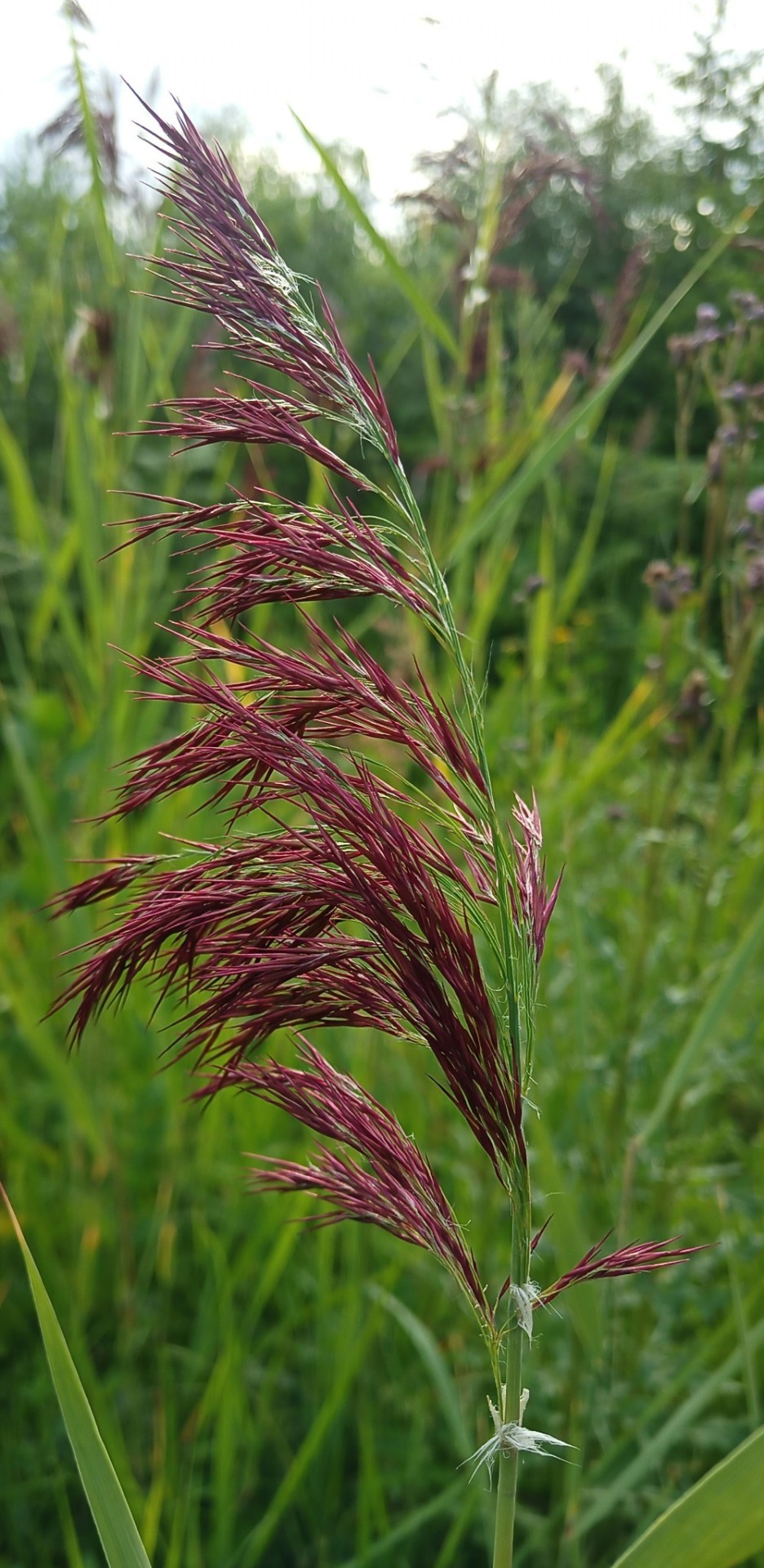
Photo : ©skondal
蘆葦 / Phragmites australis (COMMOM REED) 💞 the feeling the color~*
它生長在沼澤、湖泊或溪流、溝渠邊,喜歡潮濕向陽的環境,常成群繁生。
▪︎食用:1. 根部洗淨後可啃食,略帶甜味。2. 嫩筍可切段炒肉絲。煮熟後拌沙拉食用,更可煮湯等。嫩葉可作牛羊馬的飼料。 3. 果實去��後取米,可煮飯或者粥。
▪︎稈可建築茅屋,或代軟木作絕緣材料;其外層稈壁可織簾、席;纖維造紙。
▪︎花序作掃帚。
▪︎根入藥,為健胃和利尿藥;
▪︎是優良固堤植物。
▪︎藥用:性味~ 蘆根、蘆筍(嫩苗):甘、寒。
▪︎效用:蘆根:清熱生津,滲濕利水,除煩止嘔。治胃熱嘔噦,熱病煩咳,肺熱咳嗽,熱淋澀痛;
筍:止渴利尿。治熱病口渴,淋病小病不利;
蘆莖:治肺癰煩熱;
蘆葉:治上吐下瀉,鼻衄,肺癰,發背;
籜葉:治金瘡;
蘆花:止血解毒。
═════════ ✾ ═════════
這比喻的意思是種子是天主的話。
那些在路旁的,是指那些人聽了,隨後就有魔鬼來到,從他們心中把那話奪去,使他們不至信從而得救。
那些在石頭上的,是指那些人,他們聽的時候,高興地接受那話,但這些人沒有根,暫時相信,一到試探的時候,就退避了。
那落在荊棘中的,是指那些聽了的人,還在中途就被掛慮、錢財及生活的逸樂所蒙蔽,沒有結出成熟的果實。
那在好地裏的,是指那些以善良和誠實的心傾聽的人,他們把這話保存起來,以堅忍結出果實。
Now the parable is this: The seed is the word of God.
And they by the way side are they that hear; then the devil cometh, and taketh the word out of their heart, lest believing they should be saved.
Now they upon the rock, are they who when they hear, receive the word with joy: and these have no roots; for they believe for a while, and in time of temptation, they fall away.
And that which fell among thorns, are they who have heard, and going their way, are choked with the cares and riches and pleasures of this life, and yield no fruit.
But that on the good ground, are they who in a good and perfect heart, hearing the word, keep it, and bring forth fruit in patience.
─ 路加福音Luke : Chapter 8 : 11~15
Thank you 🙏 Amen~*
═════════ ✾ ═════════
And I love this beautiful poetry very much ..... my dad taught us since we're kids :'(
詩經 Classic of Poetry -《秦風.蒹葭》(蒹葭 : commom reed /Phragmites australis)
蒹葭蒼蒼,白露為霜。 所謂伊人,在水一方。
溯洄從之,道阻且長。溯游從之,宛在水中央。
蒹葭萋萋,白露未晞。所謂伊人,在水之湄。
遡洄從之,道阻且躋。遡游從之,宛在水中坻。
蒹葭采采,白露未已。所謂伊人,在水之涘。
遡洄從之,道阻且右。遡游從之,宛在水中沚。
youtube
#skondal#reeds#life#蘆葦#commom reed#well known chinese poetry:蒹葭 by 秦風#詩經 classic of poetry#song : 在水一方#鄧麗君 teresa teng#the feeling the color#💗
13 notes
·
View notes
Text
來首小華麗版《千言萬語》鄧麗君 Teresa Teng | 鋼琴 Piano | 我每天都在祈禱/快趕走愛的寂寞

1 note
·
View note
Text
與其在世事紛爭中潮起潮落,不如在音樂中隨波逐流。
youtube
綠樹陰濃夏日長,樓台倒影入池塘。
水晶簾動微風起,滿架薔薇一院香。
——【唐】高駢
#音樂 #古典 #唐詩 #宋詞 #經典 #詩歌
1 note
·
View note
Text
April 12, Xi'an, China, Qinglong Temple/青龙寺 (Part 3 - History):
A model of Qinglong Temple in Tang dynasty (618 - 907 AD):

There must have been something like thirty engravings of famous poems about the temple lining the walls of the corridors. Below are three examples of these engravings, from these poems one can get a feel for how Qinglong Temple used to look like. A note on the translations: they are rather unpolished as I just wanted to get the meaning across.

《題青龍寺詩》 [唐] 朱慶餘 寺好因崗勢,登臨值夕陽。 青山當佛閣,紅葉滿僧廊。 竹色連平地,蟲聲在上方。 最憐東面靜,為近楚城墻。
Translation (by me):
"In Commemoration of Qinglong Temple" By Zhu Qingyu (Tang dynasty) The beauty of this temple comes from the mountains, By the time I summited it was already dusk. Verdant peaks behind temple buildings, Scarlet leaves filling the corridors. Bamboo groves connecting flat areas, Chirping of insects above it all. Only the east side remains still, Since it's close to the city walls.

《清明日青龍寺上方賦得多字》 [唐] 皇甫冉 上方偏可適,季月況堪過。 遠近水聲至,東西山色多。 夕陽留徑草,新葉變庭柯。 已度清明節,春秋如客何。
Translation (by me):
"Qingming Festival Above Qinglong Temple" By Huangfu Ran (Tang dynasty) It's comfortable up in the mountains, Watching the season pass by. Sounds of flowing water from near and far, Views of mountains from east and west. Setting sun upon the grassy path, Growing leaves cover the courtyard trees. Qingming Festival has come and gone, Just like the seasons and the temple visitors.

《青龍寺早夏》 [唐] 白居易 塵埃經小雨,地高倚長坡。 日西寺門外,景氣含清和。 閑有老僧立,靜無凡客過。 殘莺意思盡,新葉陰涼多。 春去來幾日,夏雲忽嵯峨。 朝朝感時節,年鬓闇蹉跎。 胡爲戀朝市,不去歸煙蘿。 青山寸步地,自問心如何。
Translation (by me):
"Early Summer at Qinglong Temple" By Bai Juyi (Tang dynasty) Light shower settled the dust, Temple grounds blending with the hills. Setting sun outside temple gates, The scene filled with an air of serenity. An old monk stands in idleness, There are no worldly passersby in the stillness. Remaining birds having sung their melodies, New leaves providing ample amounts of shade. End of spring was just days ago, Summer clouds are already towering above. Every day we feel the passing of seasons, Our hair graying in the meantime. Why obsess over bustling cities, When we can return to the lush countryside? These verdant mountains are but a corner of the world, Here I stand and reflect upon the state of my heart.
Huiguo and Kukai
In the first part I mentioned that Qinglong Temple was where Kukai/空海 studied Vajrayana Buddhism (the Chinese Esoteric tradition was also called "Tangmi"/唐密, since it was very popular in Tang dynasty) under Huiguo/惠果. Huiguo was a student of the famous Vajrayana Buddhist master and translator Amoghavajra (Chinese name Bukong/不空). Huiguo eventually became a master himself in the Chinese Esoteric tradition, and was an Acharya (Sanskrit term meaning teacher; translated phonetically as asheli/阿阇黎 in Chinese) who had many students from different places, including from surrounding countries. Kukai was one of his last notable students before he passed away. Kukai returned to Japan in 806 AD and founded the Shingon school of Buddhism/真言宗 (also sometimes called Eastern Esotericism/東密).
Kukai was also a calligrapher and a poet, below are two examples of his works (first is an ink rubbing of his calligraphy work titled "Buddha", second is his calligraphy work named Huushincho/風信帖; both were written in Chinese):


Closeup of Huushincho (from Wikipedia). The original is at Touji Temple in Kyoto, Japan.

Shōryō shu/Xinglingji/性靈集, a collection of kanshi by Kukai. Kanshi/漢詩 is a Japanese word for Chinese poetry. These books here are a gift from Japan.

Bunkyō hifu ron/Wenjingmifulun/文鏡秘府論 by Kukai which discusses Chinese poetry. These books are a gift from Japan.

There are also other gifts from Japan. Left is the top of a khakkhara staff (In Chinese and Japanese: xizhang/锡杖/錫杖, shakujō/錫杖). Right is a Vajra (in Chinese and Japanese: jingangchu/金刚杵/金剛杵, kongosho/金剛杵), this is a Vajrayana ritual object. This particular Vajra is commemorative and bears the names of Huiguo and Kukai:


And that's all for Qinglong Temple. Next up is another famous temple in Xi'an, Daci'en Temple/大慈恩寺.
#2024 china#xi'an#china#qinglong temple#buddhist temple#history#chinese history#vajrayana buddhism#kukai#huiguo#buddhism#poetry#chinese poetry#my translations
96 notes
·
View notes
Text
🌺05/02LiveWell活岀美好🌺
Your value in God's eyes is eternal.
We all, with unveiled face, beholding as in a mirror the glory of the Lord, are being transformed into the same image from glory to glory, just as by the Spirit of the Lord (2 Corinthians 3:18).
05/02 Bible verses
For we through the Spirit, by faith, are waiting for the hope of righteousness. (Galatians 5: 5)
By faith we wait for the hope of righteousness by the Spirit (Galatians 5:5).
05/02Good words of wisdom
1. The more people experience life and have stories, the more they can understand tranquility and simplicity; the more superficial people are, the more restless their lives will be.
2. The strong people are not without tears, but they run with tears in their eyes. The first thing that makes people age is not their appearance, but their initiative and courage to take risks.
Hymn: The Blessed Mystery
https://youtu.be/CCFsm1YxJ3k?si=3N5FEqwVEnqHAu6G
🌺05/02活出美好🌺
你在上帝眼中的價值是永恆不變的。
我們眾人既然敞著臉得以看見主的榮光,好像從鏡子裡返照,就變成主的形狀,榮上加榮,如同從主的靈變成的 (哥林多後書3: 18)。
05/02圣经金句
For we through the Spirit, by faith, are waiting for the hope of righteousness. (Galatians 5: 5)
我們靠著聖靈,憑著信心,等候所盼望的義 (加拉太書5: 5)。
05/02金玉良言
1. 人生愈是經歷熬煉有故事的人,愈能體悟沉靜簡單;愈是膚淺單薄的人,生活愈浮躁不安。
2. 強者不是沒有眼淚,而是含著眼淚依然奔跑。人最先衰老的,不是容貌,而是積極冒險的勇敢闖勁。
詩歌:蒙福的奧秘
https://youtu.be/CCFsm1YxJ3k?si=3N5FEqwVEnqHAu6G
#photography#aesthetic#spirituality#positivity#illustration#nature#quotes#music#travel#architecture#landscape#friendship#relationship#love quotes#bible study
15 notes
·
View notes
Note
sorry to bother, but I've got a question that's been bugging me for a little while. In chapter one of Anthony C. Yu Translation, it states the monkey kings birth rock as an 'immortal stone' then goes on to describe its size. how could a stone be immortal, or is a just a way to say it was favored by the heavens?
I'm not sure, but I've always considered it to be a kind of "scholar's rock" (gongshi, 供石), a category of gnarled, pitted stones that develop in nature. They are often seen in Chinese gardens. The rocks were historically viewed as stand-ins for qi (氣)-filled mountains far away from the cities and towns where scholar-cultivators lived. I wrote the following in an old college research paper:
It’s important to point out that the very first reference to Chinese gardens appears in the Book of Changes. The aforementioned material also states that “Grace [can be found] in the hills and gardens” (賁于丘園). Here, gardens are associated with the wilderness and not a plot in a private residence. The first unambiguous mention of gardens comes from the Songs of Chu (楚辭, Chu Ci, 4th-c. BCE), an anthology of poetry written during the latter part of the Zhou Dynasty. One famous verse known as “Summoning the Soul” (招魂, Zhao Hun) describes how a shaman (巫, Wu) struggles to entice the meandering spirit of an ailing king to return by reminding him of the beautiful women waiting for him “in your garden pavilion, by the long bed curtains”.[7] Such imperial gardens took on a new significance during the following Qin (221–206 BCE) and Han dynasties (206 BCE–220 CE) as certain emperors became obsessed with Daoist immortality and built microcosms of landscapes—rocks for mountains, ponds for rivers, and trees and plants for forests—within their palaces. The hope was to entice lofty immortals to settle there and teach them their secrets of longevity. The first private pleasure gardens arose during the Han. There were two kinds, the extravagant park owned by the wealthy and the simple scholar’s retreat. The former was based on the great imperial hunting parks that served as a symbol for the emperor’s power since such spaces were stocked with exotic plants and animals gifted by conquered territories. Thus, the extravagant nature of these gardens served to broadcast the wealth and power of their owners. On the contrary, the latter were most likely born from privately owned vegetable gardens. The Book of Odes (詩經, 11th–7th-c. BCE), the oldest known collection of Chinese poetry, suggests that scholars during the Zhou dynasty already viewed their simple food gardens as relaxing places of leisure. The idea of a garden serving as a proxy for a mountain retreat was made popular by Tao Qian (陶潛, 365–427), a poet of the Six Dynasties period (220–589). His philosophy is best exemplified by poem number five of his “Twenty Poems After Drinking Wine” series: I built my hut beside a traveled road Yet hear no noise of passing carts and horses. You would like to know how it is done? With the mind detached, one’s place becomes remote. Picking chrysanthemums by the eastern hedge I catch sight of the distant southern hills: The mountain air is lovely as the sun sets And flocks of flying birds return together. In these things is a fundamental truth I would like to tell, but lack the words. Here, shear concentration of will transports an individual to the mountains far away from the hustle and bustle of daily life. This implies that any setting can be one’s own personal Eden, even a garden.

#immortal stone#Chinese garden#scholar rock#microcosm#qi energy#meditation#spirituality#spiritual cultivation#Sun Wukong#Monkey King#Journey to the West#JTTW#Lego Monkie Kid#LMK
21 notes
·
View notes
Text
Zy the Way - Then and Now - jazz + folk + poetry, from Taiwan
Drawing from ‘The Classic of Poetry (Shijing 詩經)’—an anthology believed to have been compiled by Confucius— ‘Then And Now 溯’ dives into the emotional, societal, and spiritual complexities of early Chinese civilization. Through intricately crafted jazz compositions, the album reimagines these ancient poems, merging Eastern tradition with Western musical innovation. Each track embarks on its own journey, exploring themes of identity, love, camaraderie, and the human experience, resulting in a body of work that is as timeless as it is contemporary. In collaboration with award-winning translator and scholar Dr. Annie Luman Ren 任路漫, ZY THE WAY 中庸 faithfully preserves the essence of these ancient texts while offering fresh, modern interpretations. Their multi-disciplinary approach—enhanced by stunning visual elements created by their in-house multimedia artist—transforms each performance into a fully immersive, sensory experience that captivates both the ears and eyes. Critical acclaim further highlights the band's trajectory, with ‘Then And Now 溯’ receiving two silver medal honors from the 2024 Global Music Awards for both band and composition. Since the album's inception, ZY THE WAY 中庸 has launched three singles in anticipation for the album: ‘Ten Acres 十畝之間’, ‘Blue Collar 子衿’, and ‘Sun in the East 東方之日’, accompanied by remixes from renowned DJ/producers Mark de Clive-Lowe and DJ Spinna. Limited-edition vinyl pressings of these tracks have become sought-after collector's items. For more information on our concept, visit www.zytheway.com/concept ALBUM CREDITS: Title | 專輯名稱: Then and Now 溯 Artist | 演出者: ZY THE WAY 中庸 Performers | 演出人員: - Vocals | 人聲: Caitlin Magee 凱琳, Bruce Tsai 蔡子雍 (Track 2) - Piano | 鋼琴: Matthew James Fullen 傅麥特 - Bass | 貝斯: Derrick Lin 林克安 - Drums | 鼓: Steven Ma 馬仕函, Matthew Fullen 傅麥特 (Track 2) - Poetry Reading | 詩詞朗誦: Bruce Tsai 蔡子雍 - Woodwinds & Effects (Guest) | 木管與特效: J Geddes 高杰 Composition | 作曲: Matthew James Fullen 傅麥特
6 notes
·
View notes
Text

The Butterfly Dream by Ming dynasty painter Lu Zhi (c. 1550)
“Once Zhuang Zhou dreamt he was a butterfly, fluttering about joyfully just as a butterfly would. He followed his whims exactly as he liked and knew nothing about Zhuang Zhou. Suddenly he awoke, and there he was, the startled Zhuang Zhou in the flesh. He did not know if Zhou had been dreaming he was a butterfly, or if a butterfly was now dreaming it was Zhou. Surely, Zhou and a butterfly count as two distinct identities! Such is what we call the transformation of one thing into another.”
—Zhuangzi
On the etymology of the character meng 夢 (dream).
“One of the lines in the Book of Songs 詩經 (eleventh–seventh centuries BCE), in which meng appears, reads: ‘When I see you so mengmeng, my heart is full of pain’ 視爾夢夢, 我心慘慘.”
34 notes
·
View notes
Note
has anyone ever tried to adapt the early play version of the journey? or took some inspiration? like monkey's siblings
I'm trying to only read a couple of these movie/show summaries a day in order to not get burned out but I'll be honest... I don't think a single one of them has any of their own JTTW-inspired media ;_;
On one hand, I understand. Other adaptions of Journey to the West like The Story of How Tripitaka of the Great Tang Procures the Scriptures 大唐三藏取經詩話 or Zaju 西遊記 are interesting stories on their own they never gained that popularity or notoriety that Wu Cheng'en's 西遊記 adaption. And honestly, it makes sense in that Wu Cheng'en is the most popular as it was able to take the best qualities of Wukong, keeping him a mischievous but clever monkey while still making him wise and a respected fighter. It gave Wukong layers to be able to relate to any reader, being of higher class or of lower class, gaining such attention in both entertainment and scholarly work that it gained the 'canon' status.
So sadly any background of Wukong's four siblings was dropped and has yet to ever resurface.
Some more info on those if you want to look into them more.
The same being said with Supplement Journey to the West 西遊補, Journey to the South 南遊記, and Later Journey to the West 後西遊記. Once Wu Cheng'en's 西遊記 gained that popularity and status other authors wished to contribute as well. And while I am sad that there is no media of these early contributions to the novel I also understand that they are pieces of media on their own.
The 'sequels' are stories onto themselves that offer their own allegories whether that be political or religious takes by the individual author more so using the medium of JTTW so convey their stories. Similar to how artists/writers use JTTW as a medium to tell their own stories in reimagings or adaptions.
Wukong or anyone of the pilgrimage going through other adventures within the novel or having continuations after the novel is nothing new to media in modern times as there are a lot of moves/shows with original demons or making stories of what happened 'after' JTTW so I would take it like... why would a director take someone's else blueprints for a reimaging/retelling of JTTW when they have their own version of the popular story? Why take someone else demon when you can make your own? Why remake someone else's take on Sun Clan children when you have plans of your own?
Sadly that means unless some of these earlier JTTW media become REALLY popular really soon and someone is willing to put their entire goal into making them entertaining or watchable enough for the general population I think they shall only stay where they are... they are good stories but I do think what's holding them back is that on their own, they are just okay and what really made them survive is their connection to the popular adaption of Journey to the West.
#jttw#The Story of How Tripitaka of the Great Tang Procures the Scriptures#大唐三藏取經詩話#Wu Cheng'en#Zaju 西遊記#xiyouji#西遊記#西遊補#Supplement Journey to the West#南遊記#Journey to the South#Later Journey to the West#後西遊#ask
10 notes
·
View notes
Text
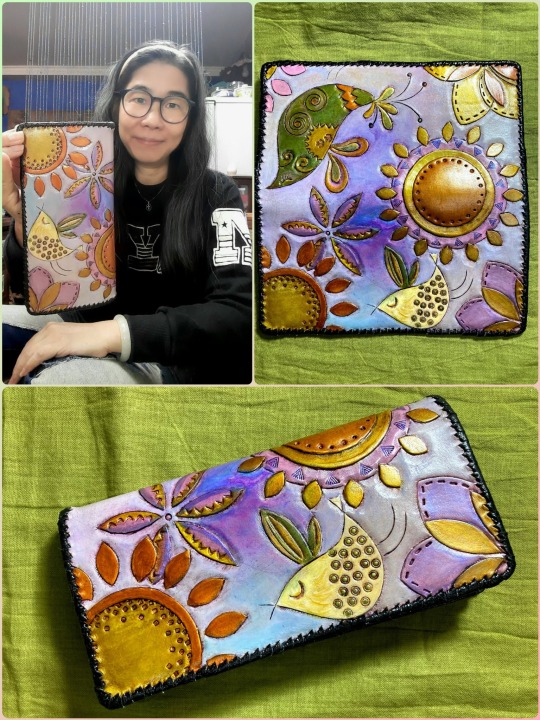
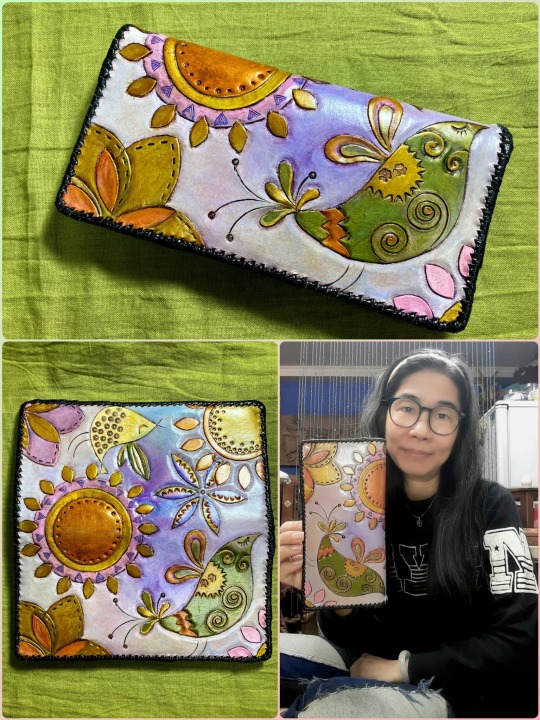









"我的每一段記憶就像那跳針的黑膠一般使我享受不已重複之樂趣;因為我已知所有的故事永不重來了。
Every memory I have is like the record skipping of vinyl that makes me enjoy repeatings again; because I have known all stories will never be repeated. "
═════ ✾ ═════
Done 交件,已寄出。Dear錦秀,明天妳就會收到包裹,請留意收件。
我說:長夾穿上新衣回家,她應當還能再陪伴妳歲歲年年。 妳說:若再髒了或有狀況,妳就再向我訂購新的,不再修了。 我說:但願我還能等到那一天。XD 妳說:不會再等10年了。hahaha 😂
(😏 我有一種已經七老八十的不安和不確定性之感覺,亦或俺已活乏了,等不了承諾的悵然… Lan~* )
PS. 軟皮縫飾的包邊線,自然而然地會在日後經常觸碰之使用中更加平整服貼。以上。 ◠‿◠
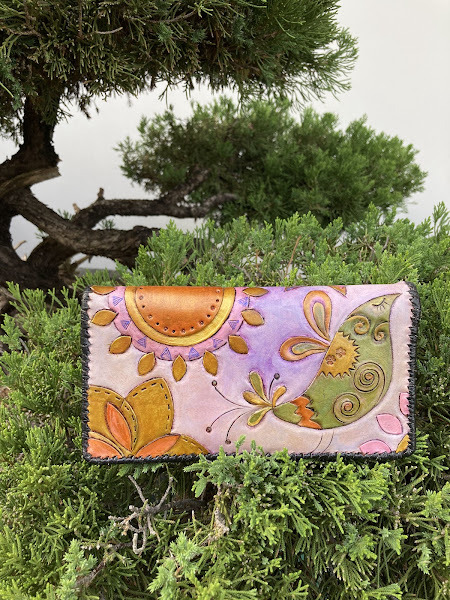
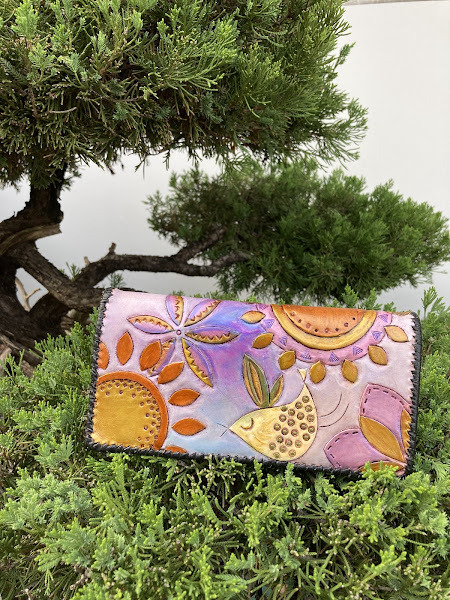


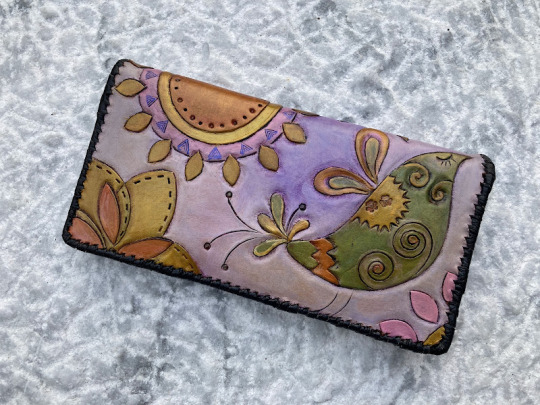

「海內存知己,天涯若比鄰。 無爲在歧路,兒女共沾巾。」
錦秀,10年前從臉書認識妳,猶記當年連絡皮夾訂購之事得知咱倆的命運相似,若言"女子婚前是命不是命,婚後���命才是命",相信妳和我早已瞭然。事已過,隨風散,心中不留痕,才真是人間灑脫。彼此祝福。等著為你的六十大壽時,要做妳的『海底世界美人魚��長夾案子。Thanks again! xoxo Lan~*
出自~唐代 || 王子安 (王勃) 之《送杜少府之任蜀州》
城闕輔三秦,風煙望五津。 與君離別意,同是宦遊人。 海內存知己,天涯若比鄰。 無爲在歧路,兒女共沾巾。
王勃(649~675)與楊炯、盧照鄰、駱賓王合稱“初唐四傑”。他的詩賦為初唐一大名家。




#chu lan#fine craft artist#朱蘭皮藝#leather art artist#台灣工藝人#artist from taiwan#i am fixing it for a good customer#also for cash honestly lol#my job my life
24 notes
·
View notes